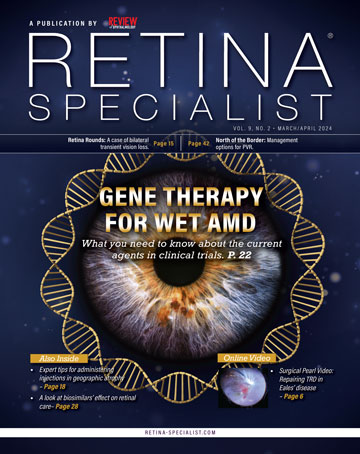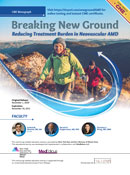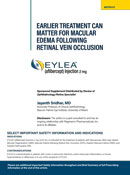Ophthalmologists, retina subspecialists and a host of other medical disciplines are hoping that Medicare hits the reset button next year on step-therapy rules for Medicare Advantage plans. This year’s plunge into “fail first,” which circumvented the normal rule-making process, has rankled a broad spectrum of medical specialty societies and may even have caught the insurance companies that administer the Medicare managed-care plans off guard.
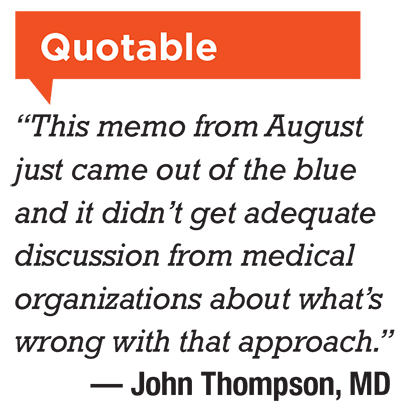 |
The Academy of Ophthalmology, American Society of Retina Specialists and American Glaucoma Society joined with the American Medical Association, along with 45 other medical specialty organizations and all 50 state medical societies, in sending a strongly worded letter imploring Center for Medicare and Medicaid Services administrator Seema Verma to walk back her plan that allowed Medicare Advantage plans to cover step therapy for physician-administered Part B drugs beginning January 1. The American Society of Cataract and Refractive Surgery sent its own letter in January. The program went into effect anyway.
It was the second time in months that the AAO, ASRS and other groups petitioned CMS to rethink a new policy. Previously, the ophthalmology societies joined with 170 other medical groups criticizing proposed rules to collapse payment rates for office visit services.
This latest round started in August when Ms. Verma came out with an edict of sorts to launch the step therapy initiative by January 1. The idea is to give MA plans a vehicle to make less-expensive therapies available as first-line treatments and then “step up” to more expensive therapies when patients fail to respond—that is, off-label Avastin before Lucentis or Eylea.
The normal rule-making process involves federal agencies publishing proposed rules, opening a comment period to receive input from stakeholders, and then drafting final rules before implementing them. But Ms. Verma short-circuited that process with her memo that rescinded a 2012 CMS memo that imposed a prohibition on step therapy for Part B. In late November 2018 CMS did publish proposed rules and opened a comment period (that since closed in late January)—but that was for rules to go into effect in 2020, not this year. MA plans already have the green light to allow step therapy thanks to Ms. Verma’s vague guidance.
| 2019 brings new look, new columnists, new print schedule to Retina Specialist
|
“This memo from August just came out of the blue and it didn’t get adequate discussion from medical organizations about what’s wrong with that approach,” says John Thompson, MD, former ASRS president and now chair of its council on health policy.
MA plans seem to be embracing the idea, even if they only had months to get ready for it. Michael Anderson, chief pharmacy officer for United Healthcare’s Medicare business, said in a press release, “Expanding the use of step therapy is a positive step forward.” Some health-policy analysts say it could encourage drug makers to be more aggressive in negotiating discounts with pharmacy benefit managers in order to get their drugs on the first step.
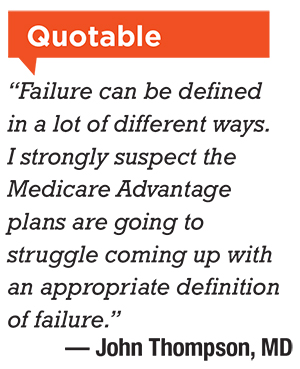 |
Ms. Verma’s guidance calls for MA plans to share savings from step edits with patients in the form of noncash rewards, presumably something like gift cards or credits for other services. The reward must equal at least half the amount saved on average per patient.
That’s one area Dr. Thompson says is ripe for abuse. The shared savings could mean a reward of
around $900 per dose for a patient who gets Avastin vs. Lucentis or Eylea. He can envision a patient who should get the more expensive drug to preserve her or his vision wanting to stay with the cheaper drug for the reward. “It creates a very perverse incentive,” he says.
Another potential problem with step edits, or “fail first”: Who defines “failure”? “Failure can be defined in a lot of different ways,” Dr. Thompson says. “I strongly suspect the Medicare Advantage plans are going to struggle coming up with an appropriate definition of failure.”
| IN BRIEF The Food and Drug Administration granted breakthrough device designation to Notal Vision for its home-based optical coherence tomography device. Notal Home OCT is a lightweight device designed for technician-free operation by patients with exudative age-related macular degeneration. It uses the Notal OCT Analyzer machine-learning algorithm to alert the treating retina specialist of any retinal fluid changes. Aerpio Pharmaceuticals has completed patient dosing in the TIME-IIb study of AKB-9778 for treatment of severe | non-proliferative diabetic retinopathy. The trial is evaluating 167 subjects with moderate to severe NPDR randomized to receive 48 weeks of once- or twice-daily subcutaneous AKB-9778 15 mg or placebo. AKB-9778 binds to and inhibits vascular endothelial protein tyrosine phosphatase, a negative regulator of Tie2. People with a history of chronic hepatitis B virus infection may be at a higher risk of developing AMD, researchers in Taiwan reported in Acta Ophthalmologica 2019. The researchers reported that patients with chronic HBV had a 41 percent greater risk of developing any type of AMD than non-infected patients. RS |
